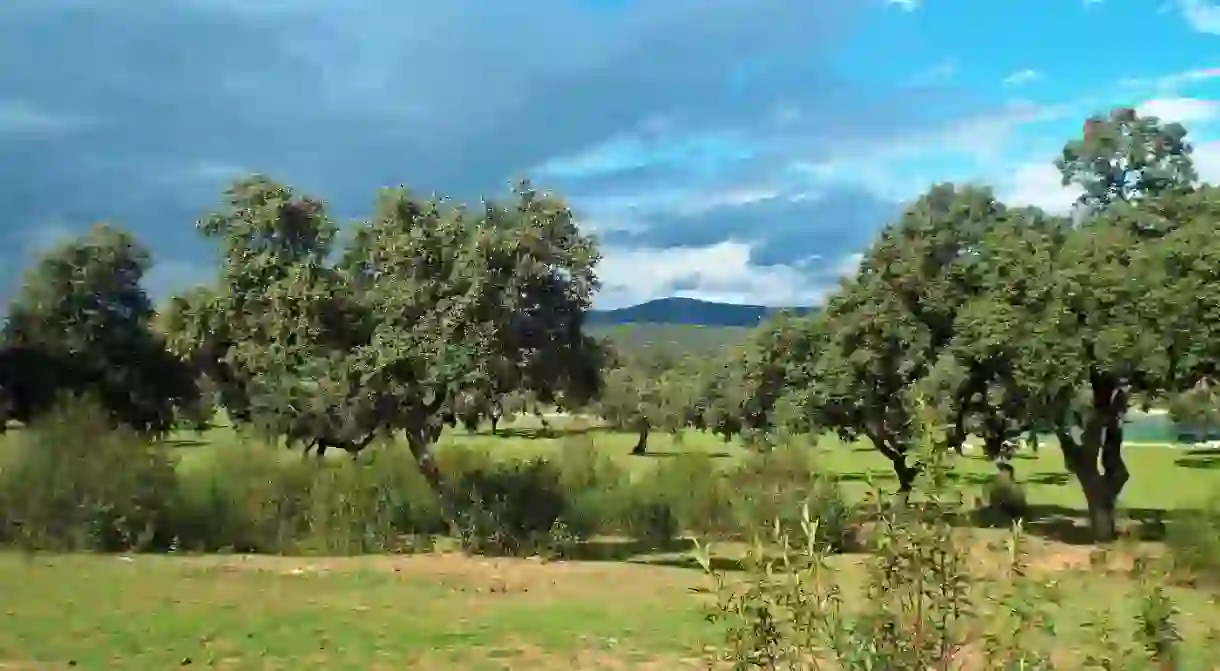10 Things You Should Know About Extremadura

Despite being known for its Iberian ham, its vast open landscapes and for being an ideal birdwatching destination, Extremadura still is by far Spain’s most overlooked region by international travellers. Yet this fascinating area has many treasures and secrets to be discovered. Read on to discover 10 things you may not know about Extremadura.
It’s a wine-lovers paradise
Spain is a world-leading wine producer, but fierce competition means many high-quality wines are unheard of abroad. Did you know, for example, that Extremadura has the second biggest wine-making area in Spain (over 80,000 hectares)? The main Denomination of Origin is Ribera del Guadiana, and two of the best areas to try local wines are Cañamero (Caceres province) and the Tierra de Barros area (Badajoz province).

Many cities around the world are named after places in Extremadura
Most Spanish conquistadors of the Americas hailed from Extremadura, and that’s why you can find towns and cities sharing their name on both sides of the Atlantic. Mérida is Extremadura’s capital city and also a large city in México. Trujillo is a Peruvian city sharing its name with one of Extremadura’s most beautiful towns (and with cities in Colombia, Venezuela and Puerto Rico). Cáceres has a Colombian counterpart. Medellín is Colombia’s second largest city, but not many know that the original Medellín is a small town in Badajoz province. Even fewer know that there are other cities called Medellín in Mexico, Argentina and the Philippines.

It boasts six UNESCO sites
Despite still being Spain’s most underrated and overlooked region for foreign travellers, Extremadura is a perfect destination for history, architecture and nature lovers. It proudly boasts six UNESCO sites, comprising three World Heritage Sites: Mérida’s archaeological ensemble, Cáceres’ medieval city centre and Guadalupe’s Royal Monastery; two Biosphere Reserves: Monfragüe and Tajo International Natural Parks; and one Geopark: Villuercas-Ibores-Jara.

Extremadura has some crazy festivals
If you think famous Tomatina is crazy, wait until you see the quirky festivals northern Extremadura has in for you. In January, head up to the mountain town of Piornal to take part in its Jarramplas festival, where a local guy wearing a colourful demon-inspired costume walks the streets playing the drum while everybody else throws huge turnips at him.
Jarandilla de la Vera celebrates an equally crazy festival in December, involving fire and called Los Escobazos. Locals wearing flame-resistant clothing and a broom gather in the main square and smack each other for three hours with their brooms, which are on fire.

It has been featured in ‘Game of Thrones’
The popular TV series chose three locations in Extremadura for filming scenes of its seventh season, all of them within Cáceres province. Trujillo’s Arab castle became Casterly Rock, while Cáceres’ magnificent medieval streets were chosen to serve as King’s Landing. Not far from Cáceres is the Barruecos Natural Park, a protected area, is home to one of Europe’s biggest colonies of white stork. In the series, the park served as the perfect background for the season’s most important battle.

Spain’s only blue flag award-winning inland beach is in Extremadura
Extremadura may be far from the coast, but that doesn’t mean the region lacks places for swimming. Not only is it the Spanish region with the most freshwater coastline and a great place for wild swimming, it’s also home to Spain’s only Blue Flag-awarded inland beach – Orellana reservoir. Located within a special protection area for birds in Badajoz province, it’s one of the biggest reservoirs along River Guadiana.

It has a secret language only 6,000 people speak
In a small and remote corner in the northwest of Extremadura, between Salamanca province and Portugal, you can hear a fala. This secret language is only spoken by around 6,000 people from three villages – San Martín de Trevejo, Eljas and Valverde del Fresno. There are several hypotheses about its origins, linking a fala with Galician, Portuguese, and the Castilian language spoken in the former Kingdom of Leon. Despite being such a little-known language, spelling and pronunciation still varies from one town to another.

Spain’s famous omelette was invented in Extremadura
There have been numerous claims from different cities as the place of origin of the famous Spanish tortilla. A recent study published by scientist Javier López Linaje revealed that the Spanish omelette was invented by two landowners from Villanueva de la Serena (Badajoz province) in 1798. To show how proud villanovenses are of their omelettes, the local authorities have announced a monument will be erected in its honour.

Extremadura is the cheapest region in Spain to buy a house
According to the latest data released by Tinsa, the Spanish home valuation specialists, Extremadura is Spain’s cheapest region for buying a house. The average price per square metre is only €768 (US$950), a figure that contrasts sharply with the €2,159 (US$2670) per square metre you would pay on average in the Madrid community. Extremadura is also one of the three Spanish regions where the house prices continue to fall year after year. If you’re looking for your dream country house in Spain on a budget, Extremadura will offer plenty to choose from.

It’s home to a ghost town
Granadilla was a thriving little town in northern Extremadura until the mid-1950s when plans to build a reservoir and the declaration of a ‘flood zone’ forced everyone to leave. Granadilla itself was never flooded, but it got surrounded by water and, even today, it’s only accessible by one pot-holed road. After decades of neglect, a restoration process started in the eighties, and some 20 houses have been restored so far. The castle tower and a walk around the fortress offer fantastic panoramic views over the remains of the old city and the nearby reservoir.














